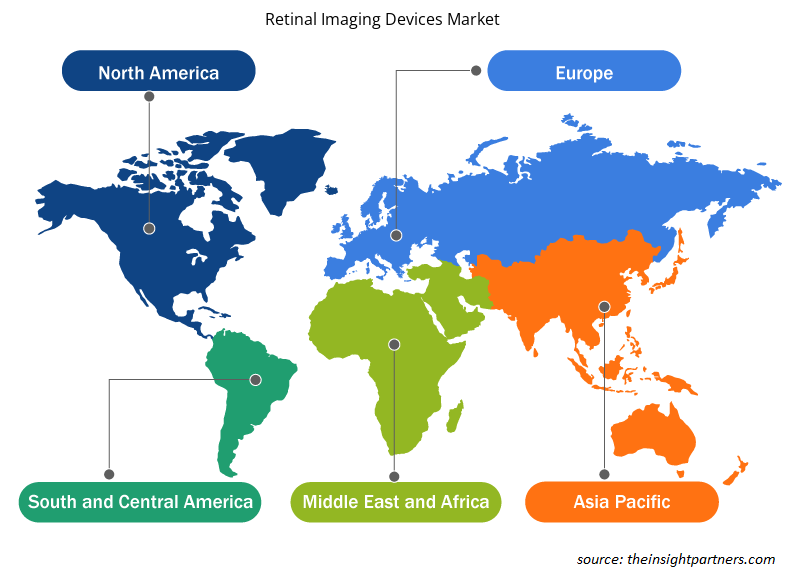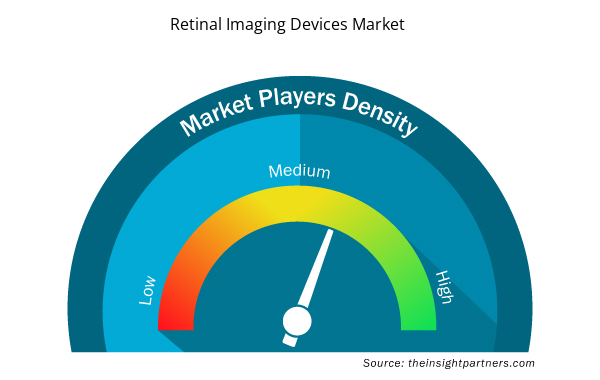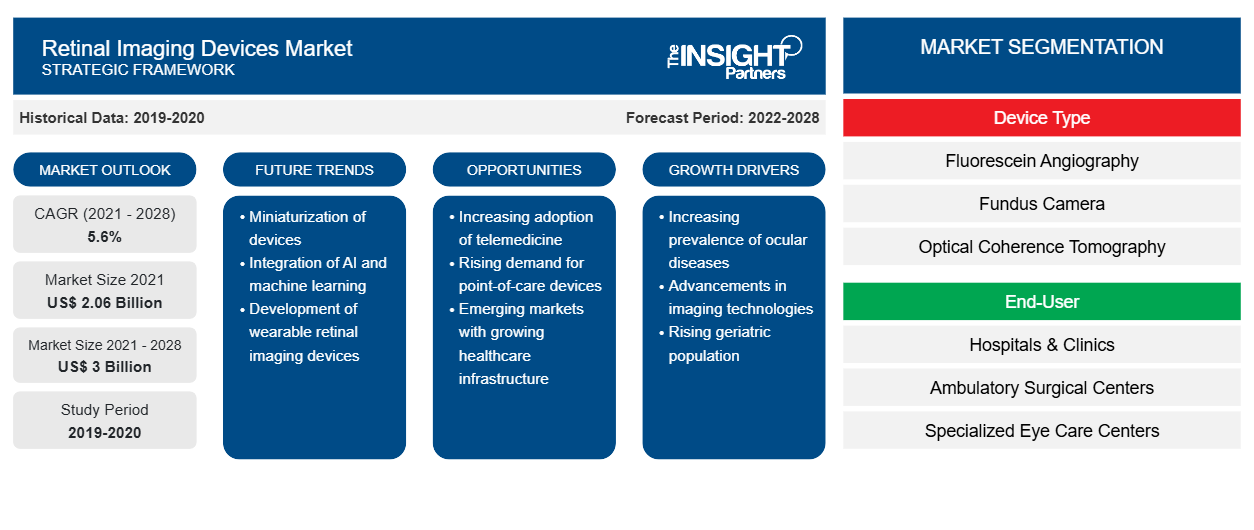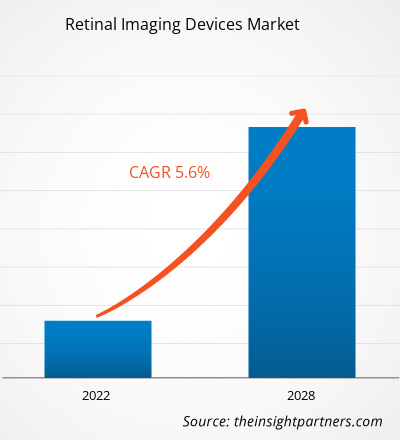视网膜成像设备市场规模预计将从 2021 年的 20.6 亿美元增至 2028 年的 30 亿美元;预计 2021-2028 年期间的复合年增长率为 5.6%。
视网膜成像是一种用于分析和诊断患者视网膜状况的技术。视网膜成像设备 (RID) 使用高分辨率成像系统来捕捉眼睛内部的图片。捕捉到的图像可帮助虚拟专用网络 (VSP) 网络医生评估视网膜的健康状况,从而有助于检测和管理眼部和健康状况,例如糖尿病、青光眼和黄斑变性等。
定制此报告以满足您的需求
您可以免费定制任何报告,包括本报告的部分内容、国家级分析、Excel 数据包,以及为初创企业和大学提供优惠和折扣
- 获取此报告的关键市场趋势。这个免费样品将包括数据分析,从市场趋势到估计和预测。
视网膜成像设备市场的增长归功于眼科医生对视网膜的接触机会的增加、全球防盲行动的增多以及技术进步。然而,OCT 设备的高成本阻碍了市场的增长。
市场洞察
眼疾患病率不断上升
视网膜成像设备广泛用于诊断和治疗各种眼部疾病,如糖尿病视网膜病变、老年性黄斑变性、青光眼、眼部黑色素瘤和轻度视力问题。此外,在世界范围内,对失明或视力障碍的关注度正在显著增长。根据世界卫生组织 (WHO) 于 2021 年 10 月发布的数据,近 22 亿人患有视力障碍或失明。其中约 10 亿视力障碍病例可以通过正确的诊断和治疗来预防。这 10 亿人患有与中度或重度远距离视力障碍或失明相关的不同眼部问题。基于形态学数据集,图像相关的诊断技术已开始为眼部疾病带来前所未有的增长。预计这一因素将在预测期内帮助视网膜成像设备市场。
基于设备类型的洞察
根据设备类型,全球视网膜成像设备市场细分为荧光血管造影、眼底照相机和光学相干断层扫描。眼底照相机部分在 2021 年占据了最大的市场份额。眼底摄影已经从电子闪光灯转变为基于智能手机的相机,再转变为较新的便携式眼科检查套件 (PEEK)。PEEK 是一款基于智能手机的全面眼科检查应用程序。这些相机的优势在于,非眼科医生也可以拍照,经过一些培训后,还可以对照片进行分级。然而,预计光学相干断层扫描部分在预测期内将在市场上实现最高的复合年增长率,为 8.1%。光学相干断层扫描可以评估在原始成像中未诊断出的不同程度的黄斑缺血。该技术被用作眼睛成像方式的标准。
基于最终用户的洞察
根据最终用户,全球视网膜成像设备市场分为医院和诊所、专科诊所、门诊护理中心等。医院和诊所部门在 2021 年占据了最大的市场份额,预计在预测期内,专科眼科护理中心的复合年增长率最高,为 6.6%。
视网膜成像设备市场区域洞察
Insight Partners 的分析师已详尽解释了预测期内影响视网膜成像设备市场的区域趋势和因素。本节还讨论了北美、欧洲、亚太地区、中东和非洲以及南美和中美洲的视网膜成像设备市场细分和地理位置。

- 获取视网膜成像设备市场的区域特定数据
视网膜成像设备市场报告范围
| 报告属性 | 细节 |
|---|---|
| 2021 年市场规模 | 20.6亿美元 |
| 2028 年市场规模 | 30亿美元 |
| 全球复合年增长率(2021 - 2028) | 5.6% |
| 史料 | 2019-2020 |
| 预测期 | 2022-2028 |
| 涵盖的领域 | 按设备类型
|
| 覆盖地区和国家 | 北美
|
| 市场领导者和主要公司简介 |
|
视网膜成像设备市场参与者密度:了解其对业务动态的影响
视网膜成像设备市场正在快速增长,这得益于终端用户需求的不断增长,而这些需求又源于消费者偏好的不断变化、技术进步以及对产品优势的认识不断提高等因素。随着需求的增加,企业正在扩大其产品范围,进行创新以满足消费者的需求,并利用新兴趋势,从而进一步推动市场增长。
市场参与者密度是指在特定市场或行业内运营的企业或公司的分布情况。它表明相对于给定市场空间的规模或总市场价值,有多少竞争对手(市场参与者)存在于该市场空间中。
在视网膜成像设备市场运营的主要公司有:
- 卡尔蔡司医疗技术公司
- Revenio 集团
- 尼康公司
- 奥普美德
- 拓普康公司
免责声明:上面列出的公司没有按照任何特定顺序排列。

- 了解视网膜成像设备市场主要参与者概况
区域洞察
从地区来看,北美地区在 2021 年占比最大,预计在预测期内也将呈现类似趋势。预计亚太地区在预测期内的增长率最高。人工智能 (AI) 和深度学习系统 (DLS) 在新加坡提高筛查覆盖率方面的应用预计将在未来七年内促进该地区的增长。
产品发布和审批是公司扩大全球影响力和产品组合的常用策略。此外,视网膜成像设备市场参与者专注于合作战略来扩大客户群,这反过来又使他们能够在全球范围内保持自己的品牌名称。
根据设备类型,视网膜成像设备市场分为荧光血管造影、眼底照相机和光学相干断层扫描。根据最终用户,市场细分为医院和诊所、门诊手术中心、专业眼科护理中心和其他最终用户。根据地域划分,视网膜成像设备市场分为北美(美国、加拿大和墨西哥)、欧洲(英国、德国、法国、意大利、西班牙和欧洲其他地区)、亚太地区(中国、日本、印度、澳大利亚、韩国和亚太地区其他地区)、中东和非洲(阿联酋、沙特阿拉伯、南非和中东和非洲其他地区)以及南美洲和中美洲(巴西、阿根廷和南美洲和中美洲其他地区)。我们研究范围内列出的一些公司简介包括 Carl Zeiss Meditec、Revenio Group Oyj、尼康公司、Optomed、Topcon Corporation、Imagine Eyes、Epipole Ltd、Forus Health Pvt Ltd、Eyenuk Inc 和 Phoenix Technology Group LLC 等。
- 历史分析(2 年)、基准年、预测(7 年)及复合年增长率
- PEST 和 SWOT 分析
- 市场规模价值/数量 - 全球、区域、国家
- 行业和竞争格局
- Excel 数据集


- Space Situational Awareness (SSA) Market
- 3D Audio Market
- Hand Sanitizer Market
- Nuclear Decommissioning Services Market
- Biopharmaceutical Contract Manufacturing Market
- Aerospace Forging Market
- Greens Powder Market
- Parking Management Market
- Saudi Arabia Drywall Panels Market
- Digital Language Learning Market

Report Coverage
Revenue forecast, Company Analysis, Industry landscape, Growth factors, and Trends

Segment Covered
This text is related
to segments covered.

Regional Scope
North America, Europe, Asia Pacific, Middle East & Africa, South & Central America

Country Scope
This text is related
to country scope.
常见问题
The global retinal imaging devices market is expected to reach US$ 3,009.55 million by 2028 from US$ 2,060.01 million in 2021; it is estimated to grow at a CAGR of 5.6% during 2021–2028.
The retinal imaging devices market majorly consists of players such as Carl Zeiss Meditec, Revenio Group Oyj, Nikon Corporation, Optomed, Topcon Corporation, Imagine Eyes, Epipole Ltd, Forus Health Pvt Ltd, Eyenuk Inc, and Phoenix Technology Group LLC among others.
The fundus camera type held the largest share of the market in 2021. However, the optical coherence tomography type is anticipated to register the highest CAGR of 8.1% in the market during the forecast period. The optical coherence tomography allows the evaluation of different levels of macular ischemia that are not diagnosed in primary imaging. The technique is used as a standard for imaging modalities for eyes.
The Asia Pacific registered as the fastest-growing region in the global retinal imaging devices market. The market in this region is expected to grow significantly in countries such as China, Japan, and India. The market is driven by the rising prevalence of eye diseases and related factors. In China, eye diseases such as uncorrected sight problems, limited access to ophthalmologists in rural parts are driving the market growth. Whereas in Japan, the cost of eye health is rising significantly, and in India, the prevalence of diabetic retinopathy is growing exponentially. Also, factors such as the rising geriatric population in South Korea and global initiatives such as Vision 2020 in Australia are likely to support the growth of the market during the forecast period
The growth of the market is attributed to the rising prevalence of eye diseases, growing global initiatives for blindness and technological advancement in ophthalmology drives the market growth. However, the high cost of OCT devices hampers the market growth.
Trends and growth analysis reports related to Life Sciences : READ MORE..
The List of Companies - Retinal Imaging Device Market
- Carl Zeiss Meditec
- Revenio Group Oyj
- Nikon Corporation
- Optomed
- Topcon Corporation
- Imagine Eyes
- Epipole Ltd
- Forus Health Pvt Ltd
- Eyenuk Inc
- Phoenix Technology Group LLC
The Insight Partners performs research in 4 major stages: Data Collection & Secondary Research, Primary Research, Data Analysis and Data Triangulation & Final Review.
- Data Collection and Secondary Research:
As a market research and consulting firm operating from a decade, we have published and advised several client across the globe. First step for any study will start with an assessment of currently available data and insights from existing reports. Further, historical and current market information is collected from Investor Presentations, Annual Reports, SEC Filings, etc., and other information related to company’s performance and market positioning are gathered from Paid Databases (Factiva, Hoovers, and Reuters) and various other publications available in public domain.
Several associations trade associates, technical forums, institutes, societies and organization are accessed to gain technical as well as market related insights through their publications such as research papers, blogs and press releases related to the studies are referred to get cues about the market. Further, white papers, journals, magazines, and other news articles published in last 3 years are scrutinized and analyzed to understand the current market trends.
- Primary Research:
The primarily interview analysis comprise of data obtained from industry participants interview and answers to survey questions gathered by in-house primary team.
For primary research, interviews are conducted with industry experts/CEOs/Marketing Managers/VPs/Subject Matter Experts from both demand and supply side to get a 360-degree view of the market. The primary team conducts several interviews based on the complexity of the markets to understand the various market trends and dynamics which makes research more credible and precise.
A typical research interview fulfils the following functions:
- Provides first-hand information on the market size, market trends, growth trends, competitive landscape, and outlook
- Validates and strengthens in-house secondary research findings
- Develops the analysis team’s expertise and market understanding
Primary research involves email interactions and telephone interviews for each market, category, segment, and sub-segment across geographies. The participants who typically take part in such a process include, but are not limited to:
- Industry participants: VPs, business development managers, market intelligence managers and national sales managers
- Outside experts: Valuation experts, research analysts and key opinion leaders specializing in the electronics and semiconductor industry.
Below is the breakup of our primary respondents by company, designation, and region:

Once we receive the confirmation from primary research sources or primary respondents, we finalize the base year market estimation and forecast the data as per the macroeconomic and microeconomic factors assessed during data collection.
- Data Analysis:
Once data is validated through both secondary as well as primary respondents, we finalize the market estimations by hypothesis formulation and factor analysis at regional and country level.
- Macro-Economic Factor Analysis:
We analyse macroeconomic indicators such the gross domestic product (GDP), increase in the demand for goods and services across industries, technological advancement, regional economic growth, governmental policies, the influence of COVID-19, PEST analysis, and other aspects. This analysis aids in setting benchmarks for various nations/regions and approximating market splits. Additionally, the general trend of the aforementioned components aid in determining the market's development possibilities.
- Country Level Data:
Various factors that are especially aligned to the country are taken into account to determine the market size for a certain area and country, including the presence of vendors, such as headquarters and offices, the country's GDP, demand patterns, and industry growth. To comprehend the market dynamics for the nation, a number of growth variables, inhibitors, application areas, and current market trends are researched. The aforementioned elements aid in determining the country's overall market's growth potential.
- Company Profile:
The “Table of Contents” is formulated by listing and analyzing more than 25 - 30 companies operating in the market ecosystem across geographies. However, we profile only 10 companies as a standard practice in our syndicate reports. These 10 companies comprise leading, emerging, and regional players. Nonetheless, our analysis is not restricted to the 10 listed companies, we also analyze other companies present in the market to develop a holistic view and understand the prevailing trends. The “Company Profiles” section in the report covers key facts, business description, products & services, financial information, SWOT analysis, and key developments. The financial information presented is extracted from the annual reports and official documents of the publicly listed companies. Upon collecting the information for the sections of respective companies, we verify them via various primary sources and then compile the data in respective company profiles. The company level information helps us in deriving the base number as well as in forecasting the market size.
- Developing Base Number:
Aggregation of sales statistics (2020-2022) and macro-economic factor, and other secondary and primary research insights are utilized to arrive at base number and related market shares for 2022. The data gaps are identified in this step and relevant market data is analyzed, collected from paid primary interviews or databases. On finalizing the base year market size, forecasts are developed on the basis of macro-economic, industry and market growth factors and company level analysis.
- Data Triangulation and Final Review:
The market findings and base year market size calculations are validated from supply as well as demand side. Demand side validations are based on macro-economic factor analysis and benchmarks for respective regions and countries. In case of supply side validations, revenues of major companies are estimated (in case not available) based on industry benchmark, approximate number of employees, product portfolio, and primary interviews revenues are gathered. Further revenue from target product/service segment is assessed to avoid overshooting of market statistics. In case of heavy deviations between supply and demand side values, all thes steps are repeated to achieve synchronization.
We follow an iterative model, wherein we share our research findings with Subject Matter Experts (SME’s) and Key Opinion Leaders (KOLs) until consensus view of the market is not formulated – this model negates any drastic deviation in the opinions of experts. Only validated and universally acceptable research findings are quoted in our reports.
We have important check points that we use to validate our research findings – which we call – data triangulation, where we validate the information, we generate from secondary sources with primary interviews and then we re-validate with our internal data bases and Subject matter experts. This comprehensive model enables us to deliver high quality, reliable data in shortest possible time.


 获取此报告的免费样本
获取此报告的免费样本